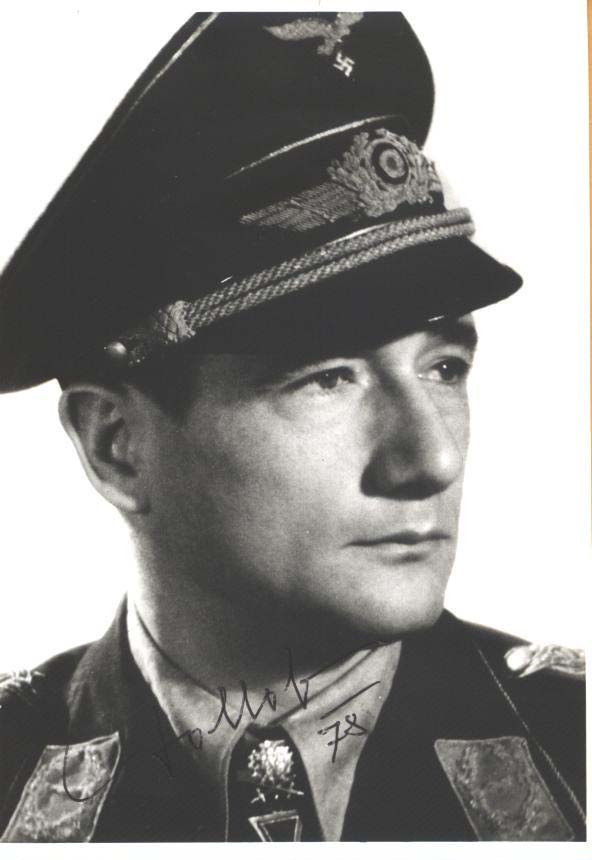
|
~SOLD~ GOLLOB Gordon
Oberst
Gollob, M. Gordon
* 16.06.1912 Wien
+ 07.09.1987 Sulingen
Awarded Knights Cross: 18.09.1941
as: Hauptmann Kommandeur II.JG 3
Awarded Oakleaves as the 38th Recipient: 26.10.1941 as Hauptmann Kommandeur II./JG 3
Awarded Swords as the 13th Recipient : 23.06.1942 as Hauptmann
Kommodore JG 77
Awarded Diamonds as the 3rd Recipient : 30.08.1942 as Major
Kommodore JG 77
Signed Postwar 4" x 6" photo 78 dated
Gollob was born in Graz. In 1933 he joined the Austrian Bundesheer as an officer cadet, and the year after he completed his flying training. He rose to command a training unit, the Schulstaffel A. When Austria was annexed by Germany in 1938, Gollob joined the Luftwaffe with the rank of Oberleutnant. On 15 March 1939 Gollob was posted to the 3./Zerstörergeschwader 76 (ZG 76) flying the Bf 110 twin-engined fighter.
ZG 76 was stationed on the Polish border and took part in Fall Weiss, the invasion of Poland from 1 September 1939. Gollob scored his first victories over Poland, and continued his success when ZG 76 took part in the Battle of the Heligoland Bight.
On 8 April 1940 Gollob was appointed Staffelkapitän of 3./ZG 76. The unit took part in Operation Weserübung and Gollob had two more victories over Norway. Later that year Gollob shot down a Spitfire during the Battle of Britain. He was then given night fighter training and assigned to II./Jagdgeschwader 3 (JG 3) on 7 September. JG 3 was stationed on the Channel Front, and saw much action. On 9 October Gollob was appointed Staffelkapitän of 4./JG 3.
In 1941 the unit was transferred east to take part in Operation Barbarossa, the code name for Germany's invasion of the Soviet Union during World War II. A few days after the invasion started, on 27 June, Gollob was appointed Gruppenkommandeur of II./JG 3, and promoted to Hauptmann. Against the weak Soviet Air Force Gollob proved quite successful, downing 18 enemy aircraft in the month of August alone. On 18 September he was awarded the Ritterkreuz des Eisernen Kreuzes for his 42 victories. In October he had an impressive 37 victories, including 9 in one day on 18 October. On 26 October he was awarded the Eichenlaub after reaching 85 victories. In December Gollob was pulled of frontline service, and was transferred to a testing unit, to help with the development of the next version of the Bf 109.
After a brief spell at the Stabschwarm of Jagdgeschwader 54 (JG 54) Gollob, now a Major, assumed command over Jagdgeschwader 77 (JG 77) as Geschwaderkommodore on 16 May 1942. JG 77 was given the task of supporting the hard fighting over the Kerch straits on the Crimean peninsula. The JG 77, led by such able experts as Gollob and Heinrich Bär leading I./JG 77, "took over" the air space over the Kerch-Taman area. Intense rivalry ensued between Gollob and Bär, each striving to outperform the other. On 20 May Gollob reached his victory number 100. On 23 June he was awarded the Schwerter, after his tally had risen to 107. Only two months later he reached 150 victories, becoming the Luftwaffe's highest scoring pilot at that point. For this he was awarded the Brillanten to his Ritterkreuz on 29 August, only number 3 to receive such honours.
On 1 October 1942, now an Oberst, Gollob was posted to the staff of Jagdfliegerführer 3 on the Channel Front, and on 15 October he was appointed Jagdfliegerführer 5, being responsible of the tactical fighter command over northwestern France.
In April 1944 Gollob was transferred to the personal staff of General der Jagdflieger Adolf Galland, to advise on the development of the jet aircraft projects. He had a falling out with Galland however, and was transferred to Kommando der Erprobungstellen, or HQ of test units. In November Gollob was appointed commander of the Jäger-Sonderstab - or special fighter commando - for the Ardennes offensive. In January 1945 Gollob was appointed General der Jagerflieger, following Galland's sacking by the OKL after the costly Operation Bodenplatte.
Gollob was an ardent party member, and was often thought poorly of by his fellow pilots. Johannes Steinhoff said about Gollob in an interview first printed in World War 2 Magazine in February 2000:
"Well, I will say this, then I will say nothing else about Gollob. Losses soared under his leadership everywhere he went, much like Göring in the first war. He placed leaders in command of units not because of their competence, but due to their loyalty to the Nazi Party, which were very few in the Jagdwaffe."
Gollob was regarded as a competent pilot, but a poor leader due to his eagerness to impress superiors and his unhealthy competitive spirit.
From Wikipedia, the free encyclopedia
Price: $0.00
Please contact us before ordering to confirm availability and shipping costs.
Buy now with your credit card
other ways to buy
|


